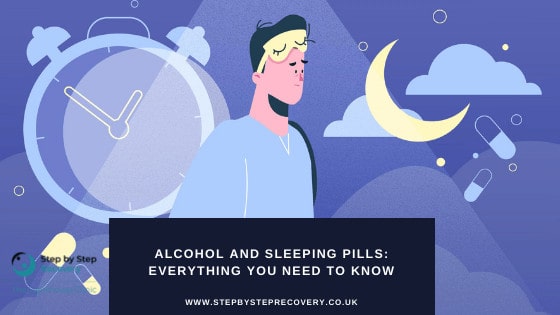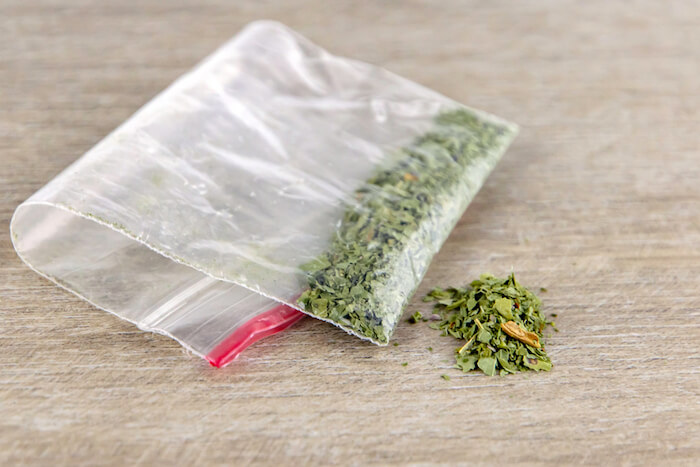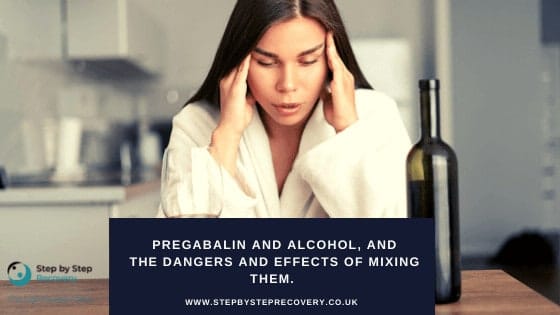Taking pills as sleep aids is not uncommon, but a common question people have is: ‘Is it safe to take sleeping pills and alcohol at the same time?’
The use of over-the-counter sleep medications has increased dramatically in recent years, as they can help with insomnia and sleep disorders. There is a potential to become reliant on them, however, so care must be taken if you want to avoid potentially unpleasant withdrawal symptoms.
With both alcohol and sleep medications acting as sedatives, you may believe that mixing the two will enhance the effects of both and promote better sleep. However, mixing both substances can result in dangerous and unintended consequences.
In this article, we’ll explore the relationship between sleeping pills and alcohol in more detail, and help you find the support you need if you’ve become dependent on either.
Why do People Mix Sleeping Pills with Alcohol?
If you are struggling to get to sleep or suffering from a sleep disorder, you may have got to the point where you have started mixing sleeping pills with alcohol.
The sedative effects of alcohol lead many to believe it will amplify the effects of the sleep medication.
Drinking alcohol can also intensify the side effects of sleeping medication, which is why many mix the two.
Sleeping Pills Side Effects and Alcohol
Sleeping pills are sedatives that work by suppressing the central nervous system (CNS). This in turn can leave you feeling relaxed enough to fall asleep quickly and contributes to deeper sleep.
You may have used alcohol as an alternative to sleep aids, as it similarly reacts with the CNS and causes brain activity to slow down. However, studies have found that alcohol can negatively impact sleep quality and length.
If you drink alcohol and take over the counter or prescription sleep medication, you may experience a range of side effects:
Poor sleep
Your liver is responsible for metabolising alcohol. As the liver enzymes work to process the alcohol during the night, your blood alcohol level decreases which can cause poor sleep.
While combining sleeping pills with alcohol can contribute to feelings of tiredness and seemingly help you fall asleep quicker, the quality of sleep you experience will be decreased. Chemical changes occur in the brain after alcohol use, especially when they’re taken in conjunction with over the counter or even prescription sleep aids.
These changes can interfere with sleep-related brain waves and cause you to feel fatigued when you wake.
Sleepwalking
Mixing sleep medicine and alcohol increases the likelihood of experiencing symptoms such as sleepwalking, sleep-eating, and sleep-driving.
The combination of substances can seriously impair your basic functions, which means you may be completely unaware of these episodes and the danger that you are in.
Respiratory distress
When taking over the counter or prescription sleeping pills and alcohol together, there is a high risk of respiratory distress. Both substances depress the respiratory system, which can lead to dangerously slow breathing and decreased oxygen supply. This can result in serious consequences such as coma, respiratory failure, and even death if not treated promptly.
The combination of prescription sleep aids and alcohol can exacerbate these effects, increasing the likelihood of experiencing respiratory distress and putting one’s health and well-being at risk.
Lowered inhibitions
Excessive drinking is often known to result in risky behaviour but combining alcohol with drugs such as prescription medication and other substances can increase the potential of lowered inhibitions or violent behaviour.
Injury
Both alcohol and sleeping pills can impair memory and cause blurred vision, which in turn can impact activities such as driving and operating other heavy machinery.
It’s important to remember that although mixing these substances won’t always lead to greater sedation, they can seriously affect your coordination, putting you at greater risk of causing injury to yourself or others.

The Impact of Alcohol on Sleep Quality
While the sedative effects of alcohol may initially make you feel drowsy and help you fall asleep faster, it can disrupt the quality of your sleep throughout the night.
Alcohol affects the different stages of sleep, including REM (rapid eye movement) sleep and deep sleep. It can suppress REM sleep, which is crucial for cognitive function, memory consolidation, and emotional regulation. This can lead to fragmented and disrupted sleep patterns, resulting in poor sleep quality overall.
Alcohol can also disrupt the body’s natural circadian rhythm, which is the internal clock that regulates our sleep-wake cycle. By interfering with this rhythm, alcohol can lead to difficulties falling asleep, staying asleep, and waking up feeling refreshed.
Can You Overdose by Mixing Alcohol and Sleeping Pills?
There is a real risk of overdose when taking sleeping pills, espescially if combined with an addiction to alcohol.
Altering the dosage of any medication can result in serious harm, and the effects of alcohol can result in over dosing your sleeping pills.
While over the counter sleeping pills and prescription sleep medications are now safer than previously, there is still a very real possibility of suffering an overdose if you mix them with alcohol. If you have developed a pill addiction, or have an alcohol use disorder, you are likely to be more at risk of overdose.
If you’re using alcohol with sleeping pills to induce sleep, you should be aware of possible symptoms of an overdose including:
- Slow breathing
- Low blood pressure and feeling faint
- Disorientation
- Slowed heart rate
- Lack of coordination
- Dizziness
- Nausea and vomiting
The Role of Healthcare Providers in Addressing Sleeping Pill and Alcohol Use
Healthcare providers play a crucial role in addressing the issue of sleeping pill and alcohol use. They have a responsibility to educate their patients about the dangers of mixing these substances and the potential risks involved. Most healthcare providers will discuss the harmful effects of combining alcohol and sleeping pills, but you need to reach out first to get help.
They can assess patients for any underlying issues that may contribute to their use of sleeping pills and alcohol. This may include underlying mental health disorders, chronic pain, chronic insomnia symptoms, or sleep disorders that need to be addressed in a holistic treatment plan.
Talking to your healthcare provider can also lead to alternative treatment options for sleep disturbances and anxiety, such as cognitive-behavioral therapy, relaxation techniques, and lifestyle modifications. They can also provide resources for substance abuse treatment and support for individuals struggling with addiction.
Common Sleeping Pills and Their Potential Side Effects
In the UK, some of the most common sleeping pills include Zopiclone, Zolpidem, and Temazepam. These medications are typically prescribed to help individuals with insomnia or other sleep disorders.
Zopiclone
Zopiclone is a nonbenzodiazepine hypnotic agent that works by increasing the activity of the neurotransmitter GABA in the brain. Common side effects of Zopiclone may include drowsiness, dizziness, dry mouth, and changes in taste. Some individuals may also experience memory problems, confusion, or hallucinations while taking this medication.
Zolpidem
Zolpidem, also known by the brand name Ambien, is another popular sleeping pill in the UK. It is a nonbenzodiazepine sedative-hypnotic that helps individuals fall asleep faster. Side effects of Zolpidem may include daytime drowsiness, headache, nausea, and diarrhea. In some cases, individuals may also experience sleepwalking, sleep driving, or other unusual behaviors while under the influence of Zolpidem.
Temazepam
Temazepam is a benzodiazepine medication that is often prescribed for short-term relief of insomnia symptoms. Common side effects of Temazepam may include drowsiness, dizziness, and coordination problems. Some individuals may also experience rebound insomnia or dependence with long-term use of Temazepam.
All these medications can have potential side effects and risks, especially when combined with alcohol or other substances. It is essential to follow the prescribed dosage and guidelines for use to minimise the risk of adverse effects.
Alternative Treatments for Insomnia and Improving Sleep Quality
While prescription sleep aids are a popular option to relieve insomnia, many alternative treatments can lead to long-term improvements that medication simply can’t manage, and avoid the risk of pill addiction.
These alternative treatments include:
1. Cognitive Behavioural Therapy for Insomnia (CBT-I)
CBT-I is a structured program that helps individuals identify and change behaviors and thoughts that are negatively impacting their sleep. It is considered the most effective non-drug treatment for insomnia.
2. Relaxation techniques:
Practicing relaxation techniques such as deep breathing, progressive muscle relaxation, or meditation can help calm the mind and body before bedtime, promoting better sleep.
3. Sleep hygiene practices:
Establishing a consistent sleep schedule, creating a relaxing bedtime routine, and optimizing the sleep environment (e.g., keeping the room dark, quiet, and cool) can improve sleep quality.
4. Exercise:
Regular physical activity has been shown to improve sleep quality and can help regulate the sleep-wake cycle. However, it is important to avoid vigorous exercise close to bedtime.
5. Herbal remedies:
Some people find relief from insomnia symptoms by using herbal remedies such as valerian root, chamomile tea, or lavender essential oil. It is important to consult with a healthcare provider before trying any herbal supplements.
6. Limiting caffeine and alcohol intake:
Both caffeine and alcohol can disrupt the sleep cycle and should be avoided close to bedtime to improve sleep quality.
7. Mindfulness practices:
Mindfulness-based techniques, such as mindfulness meditation or yoga, can help reduce stress and promote relaxation, leading to improved sleep.
It is important to consult with a medical professional before starting any new treatment or making significant changes to your sleep routine. They can help determine the best approach for your individual needs and ensure that any treatment is safe and effective.
We offer free advice on supporting and treating all types of addiction, including sleeping pill addiction. Please complete our online assessment form to learn more about our bespoke addiction treatment programmes.
Alternatively, call our understanding team on 0800 170 1222 for more information about our private-outpatient rehab and inpatient or residential rehab for addiction.
We are here to explain your treatment options and the next steps.FAQs
FAQs
Can you mix alcohol and sleeping pills?
A. You never know how certain medications will react with alcohol. The potential for experiencing adverse reactions increases based on the amount of alcohol you’re consuming and your sleeping pill dosage. While there may not be anything to say you can’t mix alcohol and sleeping pills or prescription sleep aids, it is generally recommended that you avoid doing so, because of the risk of harm that comes with it.
Can mixing sleeping pills and alcohol kill you?
A. Mixing alcohol and sleeping pills is a dangerous combination as it increases the potential for serious side effects such as depressed respiration, which can result in an inability to breathe, leading to coma and possibly cardiac arrest. There is also an increased risk of overdose, making it not worth the risk.
How long does it take for zopiclone to leave your system?
Zopiclone, a commonly prescribed sleeping pill, typically takes around 5-7 hours to leave your system. However, the exact duration can vary depending on factors such as age, metabolism, and liver function. It is important to avoid mixing zopiclone with alcohol or other substances that can further slow down its elimination from the body, as this can increase the risk of harmful side effects and potential overdose. It is recommended to always follow the prescribed dosage and consult with a healthcare provider if you have any concerns about the use of zopiclone or other sleeping pills.
What happens if you take zopiclone every night?
If you take zopiclone every night, you may become dependent on it and may experience withdrawal symptoms if you suddenly stop taking it. It is important to follow your doctor’s advice and only use zopiclone for a short period of time to avoid dependency and withdrawal symptoms. If you have been taking zopiclone for a long time, your doctor can help you come off the medication gradually to prevent withdrawal symptoms. It is important to not take zopiclone every night for an extended period of time to avoid these risks.
What happens when you mix alcohol and sleeping pills?
A. Mixing alcohol and sleeping pills is a dangerous combination as it increases the potential for serious side effects such as depressed respiration, which can result in an inability to breathe, leading to coma and possibly cardiac arrest. There is also an increase risk of overdose, making it not worth the risk.




